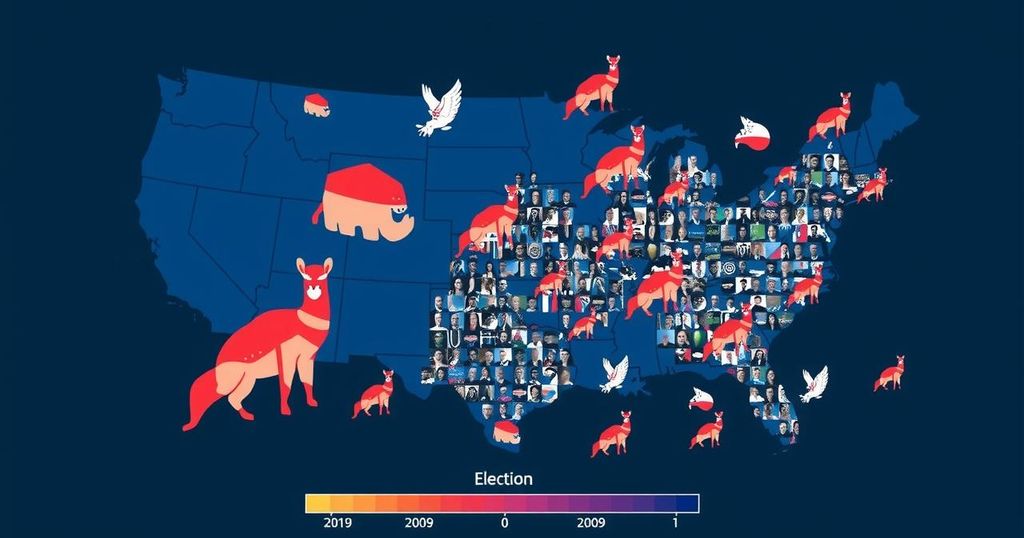The upcoming U.S. election is crucial, with potential global ramifications depending on whether Americans elect Kamala Harris or Donald J. Trump. Key concerns range from international policy on conflict zones like Gaza and Ukraine, to trade relations with China and climate change actions. The election reflects a pivotal moment in which global dynamics may shift, affecting alliances and international agreements.
The upcoming U.S. presidential election holds significant implications not only for American citizens but for global dynamics as well. The potential election of Vice President Kamala Harris or former President Donald J. Trump will impact various international issues, including the conflicts in Gaza and Ukraine, climate change initiatives, and global trade relations. Among the pressing inquiries is what type of superpower the United States will aspire to be in the foreseeable future: is Donald Trump an exception to the norm or is President Biden’s approach? Discussions with foreign correspondents underscore that this election is polarizing, influencing global perspectives and reactions in both anticipated and surprising ways. In Israel, polling indicates that many Israelis would prefer a Trump victory due to his supportive rhetoric on issues of Jewish settlements and a tougher stance on Iran. However, the fundamental Israeli opposition to Palestinian statehood may remain unchanged regardless of the winner. It is probable that President Harris would exert increased pressure for peaceful negotiations with Palestinians, while Trump’s unpredictability concerning Middle Eastern diplomacy could lead to strained relations. For Russia and Ukraine,Trump’s previous remarks that persuade blame on Ukraine for the invasion by Russia create considerable apprehension. Ukrainians fear a Trump presidency may precipitate a hasty and disadvantageous peace accord favoring Russia, while a Harris administration might continue strong support for Ukraine. However, President Putin perceives both candidates as potentially less dedicated to Ukraine compared to Biden, creating options for negotiation if either were to win. A Trump re-election might signify America’s retreat from global engagement, reassuring Putin regarding his ambitions in the region. In relations with China, a hawkish approach is expected from the next U.S. president. The Chinese perspective is split; while Trump’s contemplated higher tariffs could harm their economy, his less committal stance on alliances may appear favorable. Conversely, Harris is expected to continue strengthening alliances with countries bordering China, which could further isolate Beijing in international affairs. In Europe, reactions to Trump’s potential victory oscillate between alarm and anticipation. Concerns arise that a Trump administration could embolden nationalist factions within Europe, alongside exacerbated trade tensions through proposed tariffs which may severely affect the European economy. Conversely, a Harris presidency could signify a continuation of Biden’s foreign policy approach but may still leave European leaders seeking greater self-reliance in defense matters. Globally, the election serves as a referendum on trade policies. Trump favors aggressive tariff increases, which could escalate global trade wars and signal a retreat from international trade agreements beneficial to many nations. On climate issues, a Harris presidency may continue the transition toward renewable energy, while Trump could reverse regulatory measures aimed at reducing emissions and harm the energy transition’s pace. In summary, the forthcoming U.S. election will indubitably reverberate throughout international relations. The votes cast by Americans could steer the direction of alliances, economic policies, and climate action, ultimately impacting the lives of individuals and nations across the globe.
The impact of U.S. elections extends beyond domestic borders, as American foreign policies significantly shape global relations and responses. The differing approaches of candidates reflect underlying philosophies that resonate on a worldwide scale, influencing allies, adversaries, and neutral nations alike. Understanding the nuances of these dynamics provides insight into global stakes and anticipated changes under new leadership.
In essence, the outcomes of the U.S. election will dramatically influence global geopolitical and economic landscapes. Whether characterized by isolationism under Trump or potentially cooperative policies under Harris, the implications extend from Middle Eastern conflicts to trade relations and climate diplomacy. Observers worldwide await the decision, aware it will have profound consequences.
Original Source: www.nytimes.com






